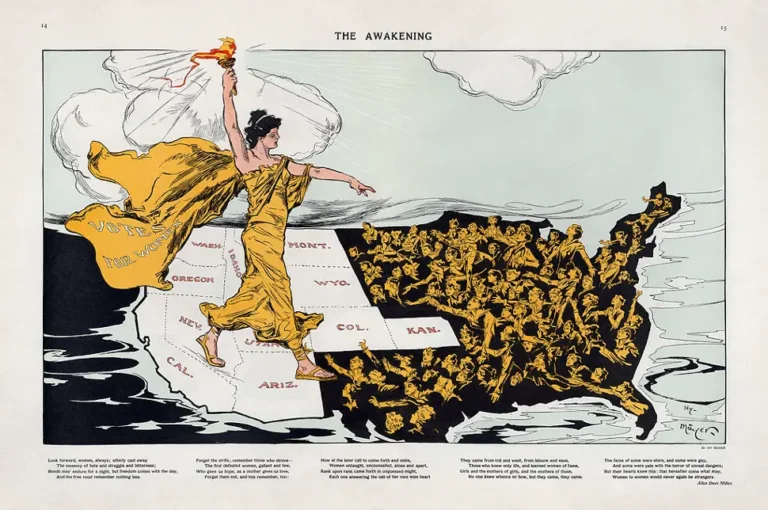What was the Progressive Era in the United States?
The Progressive Era is the period in the history of the United States from the 1890s until the United States entered the First World War in 1917.

At the end of the Gilded Age, the United States was characterized by extreme social inequality. The so-called robber barons, including entrepreneurs such as John D. Rockefeller, J. P. Morgan and Cornelius Vanderbilt, had amassed a significant share of the nation’s wealth and established industrial monopolies. By 1890, the richest one per cent of Americans controlled more than half the nation’s wealth. The rapid industrialization of the country had made the USA one of the world’s greatest economic powers, but it had also led to disastrous conditions in urban slums, overstretched infrastructure, pollution and unsafe working conditions. In addition, the country’s political system was rife with patronage and corruption. At the same time, forces were emerging in society that demanded fundamental reform and modernization of the existing political, social, societal and economic conditions in order to meet the challenges of the times.
How Did The Progressive Era Start?
The progressive movement that began to emerge was informed by the ideas of the Enlightenment and believed that human conditions could be changed. It called for a greater role for the state in regulating economic and social life and improving the situation of the general population. Another important feature of the Progressives was their belief in social planning and scientific government management to solve social problems. The Progressive movement was diverse, but it drew heavily on the middle classes. Its supporters included members of both major parties (Democrats and Republicans). It was opposed by conservative forces of the Old Right who opposed any expansion of government power. The means used by the movement to achieve its goals included social activism and support for political candidates at local, regional and national levels.
Important Figures In The Progressive Era
Important activists included Jane Addams, who helped immigrants integrate into American society, and Ida Tarbell, a journalist who exposed the corrupt practices of the Standard Oil Company. Political supporters of the movement included Presidents Theodore Roosevelt (in office from 1901 to 1909) and Woodrow Wilson (in office from 1913 to 1921). Other important politicians included Republicans Robert M. La Follette and Charles Evans Hughes, and Democrats William Jennings Bryan and Al Smith. Other important people associated with Progressivism were Sophonisba Breckinridge, Walter Lippmann and Henry Ford. The main demands of the Progressives included the improvement of workers’ rights, the introduction of women’s suffrage, economic reforms and the breaking up of monopolies, environmental protection and the introduction of measures to improve the situation of the poor through the establishment of a welfare state.
Important Events In The Progressive Era
With regard to workers’ rights, the Progressives called for the strengthening of trade unions, the introduction of the eight-hour day, the abolition of child labor, higher wages and improved safety at work. At the political level, they called for the strengthening of direct democracy, measures to curb political corruption, and a reduction in the influence of large industrialists in American politics. The Progressive movement achieved significant political successes. The Pure Food and Drug Act of 1906 improved consumer protection and created the Food and Drug Administration (FDA). The creation of the Federal Reserve System in 1913 overhauled the banking system, and the establishment of the first credit union in 1908 introduced the cooperative system to the US. The Clayton Antitrust Act of 1914 restricted the creation of monopolies, following the Sherman Antitrust Act of 1890. American women were finally granted the right to vote nationwide in 1920.
Many progressives were in favor of restricting immigration to protect native workers. During this period, the Immigration Act (1917) and the National Quota Act (1921) were passed, restricting immigration and almost completely banning immigration from Asia. The situation of African Americans and other minorities did not improve. In fact, this period coincided with the nadir of American race relations, and the Ku Klux Klan intensified its activities. Some progressives advocated eugenics. In 1907, the United States became the first country to pass a compulsory sterilization law, which led to the sterilization of over 60,000 people. In terms of foreign policy, the Spanish-American War of 1898 was the most significant event of the Progressive Era. The progressive movement finally split when the US entered the First World War. After the First World War, the Progressive Era was followed by the Roaring Twenties and the Great Depression. Many of the progressive movement’s ideas for reform later had a major influence on Franklin D. Roosevelt’s New Deal in the 1930s. Franklin D. Roosevelt in the 1930s and the expansion of the American welfare state.
Conclusion
The Progressive Era was a period of significant change and reform in American history. Born in response to the growing social and economic inequalities of the Gilded Age, it saw a strong push for political, social and economic reform. Thanks to the activism of figures such as Jane Addams and Ida Tarbell, and the support of political leaders such as Theodore Roosevelt and Woodrow Wilson, the Progressive movement achieved major legislative victories and helped to transform the political and social landscape of the United States. Despite its challenges and controversies, the legacy of Progressivism has continued to influence the course of American history, inspiring subsequent reforms such as Franklin D. Roosevelt’s New Deal and shaping the political and social landscape of the United States. Roosevelt’s New Deal and the development of the American welfare state.
